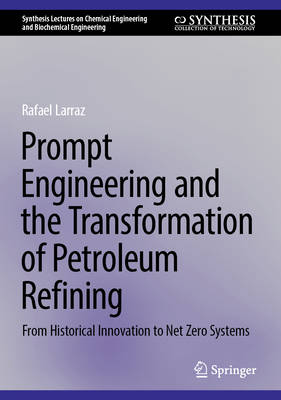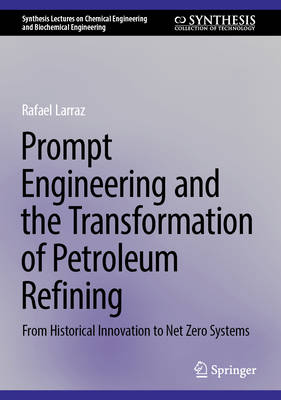
- Afhalen na 1 uur in een winkel met voorraad
- Gratis thuislevering in België vanaf € 30
- Ruim aanbod met 7 miljoen producten
- Afhalen na 1 uur in een winkel met voorraad
- Gratis thuislevering in België vanaf € 30
- Ruim aanbod met 7 miljoen producten
Zoeken
Prompt Engineering and the Transformation of Petroleum Refining
From Historical Innovation to Net Zero Systems
Rafael Larraz
€ 42,95
+ 85 punten
Omschrijving
The petroleum refining industry stands at a critical juncture in its evolution. After more than a century of technological advancement, the sector faces unprecedented pressure to reimagine its operations in response to climate change imperatives, market transformations, and societal expectations. This transformation requires a shift in how fuels and chemicals are produced. At the same time, the revolution in artificial intelligence through the development of Large Language Models (LLMs) that are trained on vast amounts of data, allows remarkable capabilities in knowledge integration and problem-solving across diverse domains. The emergence of sophisticated prompt engineering has transformed these models from research artifacts into practical tools for addressing complex industrial challenges. This book explores the convergence of these two transformative forces: the imperative to reimagine industrial hydrocarbon processing and the emergence of AI systems capable of supporting that reimagination. It examines how LLMs, when properly directed, can accelerate the transition toward more sustainable refining technologies by enabling more efficient knowledge synthesis, system design optimization, and innovation across disciplinary boundaries.
Specificaties
Betrokkenen
- Auteur(s):
- Uitgeverij:
Inhoud
- Aantal bladzijden:
- 225
- Taal:
- Engels
- Reeks:
Eigenschappen
- Productcode (EAN):
- 9783031997273
- Verschijningsdatum:
- 3/01/2026
- Uitvoering:
- Hardcover
- Formaat:
- Genaaid
- Afmetingen:
- 168 mm x 240 mm
- Gewicht:
- 585 g

Alleen bij Standaard Boekhandel
+ 85 punten op je klantenkaart van Standaard Boekhandel
Beoordelingen
We publiceren alleen reviews die voldoen aan de voorwaarden voor reviews. Bekijk onze voorwaarden voor reviews.








